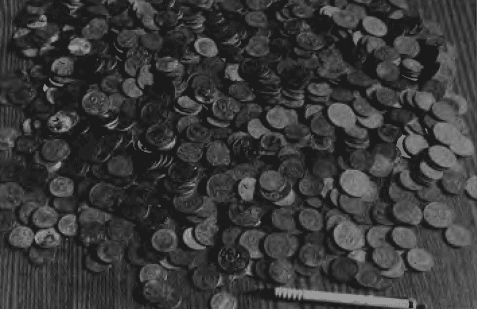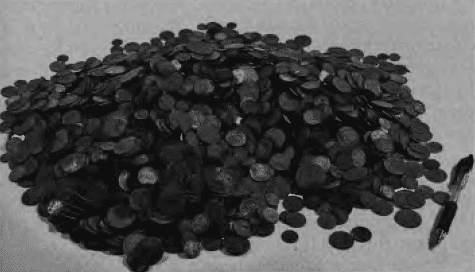Having at its disposal a metal detector, most begin with a search coins, as this is the most simple form of device. Some, however, be sceptical. Who loses a coin? Whether they should be looking to spend on it the time and effort? Skeptics respond immediately to look for the worth! Every day people lose millions of coins, and this continues for hundreds of years. The number of lost coins exceeds the number of coins currently circulating. In different countries every year they go on the turnover of large quantities of coins instead of lost. Of course, the cost of modern coins is low, however, some ancient coins priced very high ($100 to several thousand dollars).
Where can you find the coins? The answer is simple - wherever there were people. Modern coins you can find on the beaches, parks, picnic areas, etc. ibid. often found old coins. However, to find the older and more valuable coins, requires research and historical studies. Need figure out where the people gathered. It could be a fair place at river crossings, marinas, mills, etc.

Fig. 35. This pile of coins was found by a simple metal detector Fisher 1212 on the beaches of lake Balaton in Hungary for three days
Virtually any metal detector can be used to search for coins, but the most suitable are devices with automatic ground balance and good discrimination. From inexpensive devices are well established for this purpose metal detector Compadre, Silver, Conquistador, DeLeon, Tejon, Cibola, Vaquero company Tesoro. More expensive computer equipment (Spectrum XLT, DFX Spectrum, Garrett GTI 1500, Garrett GTI2500, Explorer SE) have special programs for finding coins, which allow you to ignore metal debris, show even the denomination of the coin (USA) and the depth of its occurrence. Firm Garrett released in 2006, relatively cheap computer devices ACE 250 and ACE 150, which are in great demand among beginners search engines.
When working is very useful to use headphones, especially when searching and deep small coins, the so-called flakes.
Typically, when you scan the coins give short clear signal when moving the coil in either direction. If the scan signal is obtained by the movement of the coil in one direction only, try to scan the object from a different angle. Often when you get a normal signal, often indicating that near the coin is an object of discharge of garbage.
Normal scanning speed is -50 cm/sec., at which the device time to analyze the object. However, in heavily littered areas the scanning speed is preferably reduced to 15-20 cm/sec. Coil can be led right on the ground, but it is necessary to apply a protective cover over the coil.
Almost all instruments company Tesoro (except Compadre) are completed in currently elliptical coils. These coils have a larger capture and depth, work successfully in littered areas. To determine places search, turn on your imagination. Imagine where before you could gather people, a lot of people. It could be the beaches, parks, fairs and markets, schoolyards etc. Each of these places has its own characteristics. So, the beach can to find a lot of modern coins. However, beach the beach discord, sea beaches differ from the beaches of rivers, lakes and ponds that during the storm of pebbles and sand intensively move along the coastline. When this is moved and lost coins often gathering in a particular place in large quantities. River the beaches in the spring during flood updated and coins so there is virtually no remains. Much more coins (and jewelry) on the beaches of lakes and ponds, especially in areas covered with grass. There coins accumulated from year to year, and if there was no one with the instrument, then you are very lucky. Look for such place for old books, guidebooks and postcards.
Many ancient coins can be found in parks and squares, which in most cities have been preserved from ancient times almost unchanged. These were places of festivals and recreation, picnics on the lawns and various other events which gathered many people. Should look under large trees, glades about former buffets and dance floors, along the tracks, where there were benches.
If you manage to find the places of fairs, there you will also find hundreds of ancient coins. Often these fairs were arranged near the churches. In our time on these places can be buildings or gardens, the owners of which, perekapyvaya beds, wonder why the earth has so many coins. Explore the surrounding villages and find out who's got the garden or in the garden meet in the land coins. Most Housewives for a small fee, will gladly let you in the autumn the garden to work with a metal detector. Valuable information can be obtained from tractor, plowing fields meet the space with soil and shards ware. Often come here and coins.
Many coins can be found near the old mills, former restaurants, ferry ferries, jetties, bridges, station squares, etc. Usually in such places, people waiting often sat and lay on the ground and lost coins. Sometimes the finds of coins happen in the field, and in a small area can collect tens or even hundreds of pieces. It plowed treasures, and we will discuss them in section about treasure hunting.

Fig. 36. Coins found metal detecting on the beaches of the Moscow river
With time lost coins sink into the ground, or rather, above them is growing a layer of soil through dust, sand and rotten grass. Usually 80-100 years coin it appears at a depth of from 2 to 20 see generally, coins laid flat. So any detector confidently detect them. To retrieve the coins used scoop, knife or screwdriver. Via the probe can be accurately to set the location of the coin. Collecting coins, don't forget to dig for a fossa. Excavated debris (plugs, nails etc.) also collect in a separate bag and then throw it somewhere in a suitable place. Who knows, maybe owning a more powerful device, you will again come to this place to gather a new crop.
Author: L. V. Bulgak






